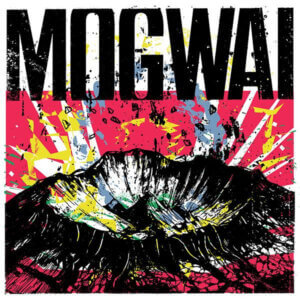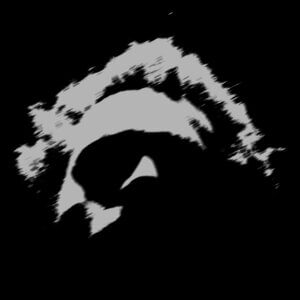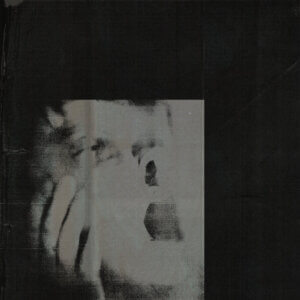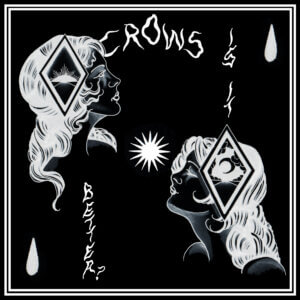Crows find better ways to be on exhilarating new record, Reason Enough
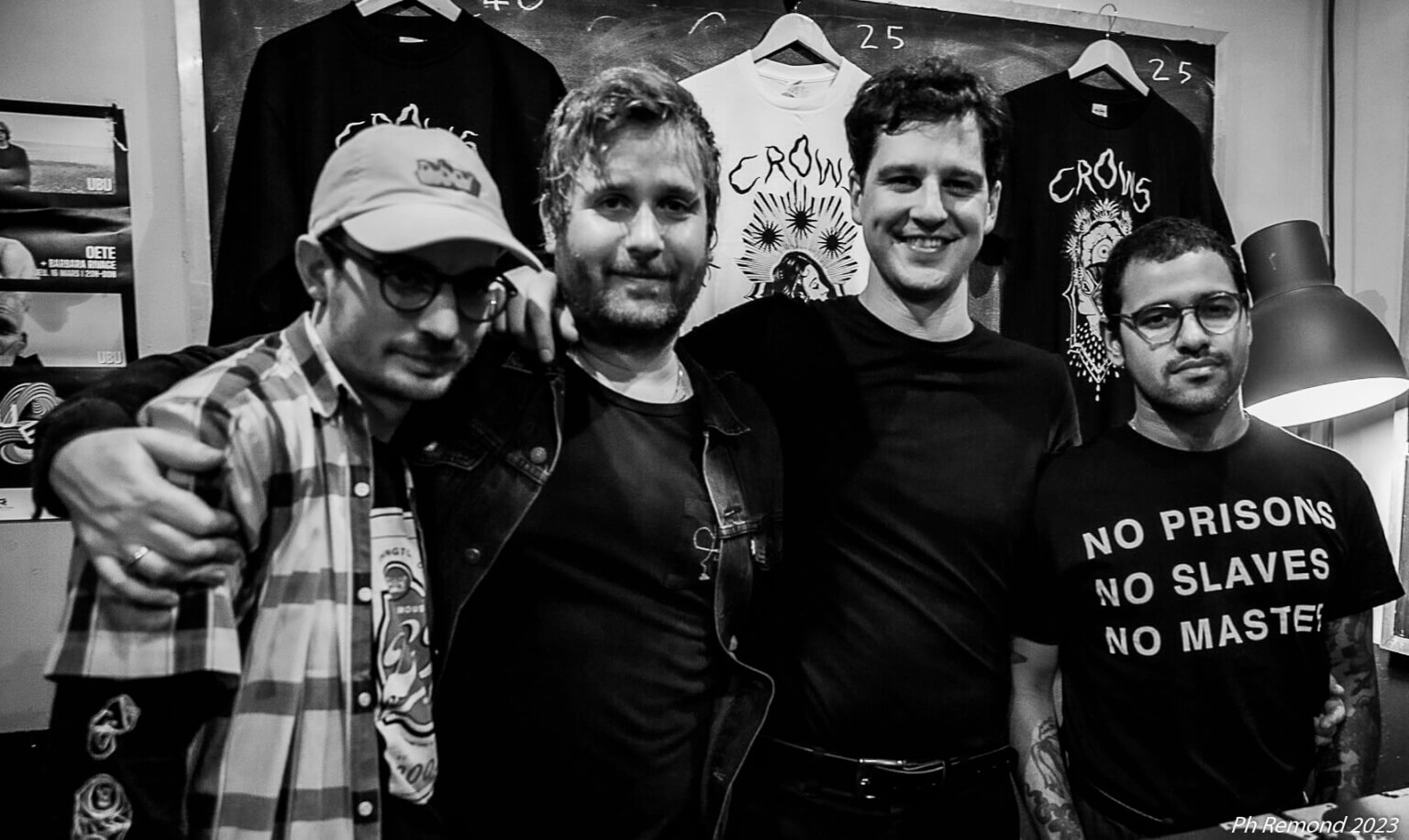
Describing their long-awaited third studio album, Reason Enough, frontman James Cox noted, “If the last album was angrier, this one is definitely sadder”. The London-based quartet have effectively and eloquently distilled 2 years of experience and hardships, personal and professional, into ten brilliantly propulsive arrangements. Tonally, the band strike comparisons to Editors, Echo & The Bunnymen with Cox’s intense vocal performance sometimes evokingInterpol’s Paul Banks. The searing energy coursing through the instrumentation across their latest work is utterly contagious and yet, when you delve deeper to decipher the lyrical content, its melancholic sensibility is starkly displayed. Blocking out internal strife and feeling stifled by routine and reality are frankly communicated throughout. In this regard, Cox is an immensely commanding presence for the entirety of Reason Enough’s duration, his bandmates perfectly encapsulating the darkness anchoring his words whilst uplifting him and the record’s atmosphere. Shifting between fraught and fragile sensibilities, Reason Enough is a remarkably engaging body of work and immediately asserts itself as some of Crow’s finest songwriting and musicianship.
With the impending release of Reason Enough via Bad Vibrations on September 27th, Northern Transmissions spoke to Crows’ vocalist and lyricist James Cox about the band’s varying recording techniques, the process of writing their most personal lyrics to date and exploring the band’s many chapters.
NT: In the press materials for your forthcoming release, Reason Enough took the longest to write of all your albums. Lyrically, the songs openly explore and confront a variety of personal experiences and feelings. I wondered whether that self-reflective aspect played a hand in extending the songwriting process?
James Cox: That’s interesting because I’ve done a few interviews around the album and either people pick up on the political side of it or the much more personal side of it. Generally, people have been leaning more towards the political side. In my head, it’s not intentionally meant to be a very political album. From what I write about anyway, some of it just became quite political. To me, it’s quite a personal record, it’s way more about a year of pretty unsteady mental health I had coming off the back of a long term relationship. A lot of it, to me, is more so looking at and dealing with that side. And so, when people mentioned the political thing, well, that’s what I write about anyway. So for me, it’s kind of split.
I think it took longer to write because of our work commitments. I don’t think we felt particularly rushed, either. I think with Beware Believers, our last record, we felt quite rushed to put something out and keep the ball rolling following our first record. It’s just hard to keep-up with that release expectation. Which, if you don’t have something ready a year in advance and you don’t have anything ready to release, you just feel like you’re going to drop off the map a little bit. Whereas, with Reason Enough, we were like, ‘You know what, fuck that. It doesn’t matter, it’ll come out when we finish it’. We didn’t feel under pressure to get it out as quickly as possible. We decided to just take our time with it and write as much as we could. Which is what you’re supposed to do with albums; have more songs than you need and then pick and choose. That’s what we actually did for this one. We wrote about 15 songs and then picked 10 from that, which we’ve never done before. We’ve always either written the exact amount or compiled loads of songs that we had because our first album was more of a compilation of songs we’d written over a period of five years. Whereas with Beware Believers, we wrote that in around three months; as fast as we could.
This one, as you said, took a little bit longer and I’m glad we took our time with it because it’s definitely…and I know everyone says this about their new music, but I think we’re definitely most proud of this album, lyrically. And the way it’s recorded, as well. I think the overall sound of the album brought a change for us, which we quite enjoyed.
NT: How was it narrowing the 15 songs to 10 for the album? That must be difficult with members of the band having different emotional connections to particular songs.
James Cox: It’s not fun, let’s put it that way! Everyone’s got a different opinion. It was really hard, to be honest. There were some songs that we felt didn’t really fit with the others and that maybe made it a little bit easier to cut. But yeah, it’s not fucking easy because everyone’s got something to say about why they like that or why they think it should go on there. Then you get the manager involved and also Andy [Savours], the producer we worked with was involved, saying ‘I think it should be this, I think it should be that’. It was a lot of compromise within the camp of what made the album work as a whole.
NT: The album opens with the line, “I’m so full of doubt, I’m certain of that.” Later on in the tracklist, there’s the song “Visions of Me” where you sing, “If I don’t learn from my past how can I attempt to grow?”. You mentioned earlier how you had some difficult experiences that impacted your mental health prior to writing the album. How was it for you to bring these songs to the band for the first time and record the vocals for the album?
James Cox: That’s a good question. Songwriting is a real pleasure to be able to do. It’s really cathartic, especially for working through stuff. It’s a very good form of therapy, it’s really helpful if you’re going through stuff to be able to articulate those feelings into writing. But, it’s a bit of a double-edged sword because you write to process things and get through them and then the second half of the process is that you have to keep revisiting it when you’re singing it live, over and over and over again. So, it is a double-edged sword in that, yes, it’s really helpful but you also can never fully put it in the past.
I have songs, for instance, “Healing”, from the second album, is a great example of how there’ll be nights where I’m singing it live and I’m not even thinking about it and then there’s other nights where you’ll get certain memories come back in and sneak their way back into your brain and it’ll become a bit more emotional. So yeah, I knew this album was going to be deeper, if you will, because I went through a very unstable year of mental health. But, I’m really proud of the songs, I’m so happy with them and I’m in a really good place now. It really helped me get to the place where I am now. At first I was a bit wary about being so honest because I think in a lot of my older writing, I’m a bit more nuanced and a bit more vague. I used to do a lot of character writing where I’d write about other situations in my life, other people’s situations in life, but from a first person perspective. This was the first time I’ve been really, really honest about a lot of my feelings.
Everyone who’s heard the album, and especially the singles, the music seems to have really connected with a lot of people which is always a really nice thing to hear. Because again, those feelings are quite isolating. When you actually speak to someone who, and you might not have gone through the same thing, but they can relate something they’ve gone through to what you’re saying. It’s always really nice because you remember that you aren’t alone. Everyone has those feelings. They aren’t solely your problem and your pain. It really means a lot when our music resonates with people and they tell me how much it means to them because, you know, everyone goes through their own stuff.
NT: Absolutely and that’s such a huge reason why we turn to music. Back to the recording of Reason Enough, is it true that the album was recorded in the crypt of an old Catholic church?
James Cox: We wrote a lot of it there, we didn’t record it there, though. It was actually an old convent! They’d set up a little studio in the crypts and there’s this huge old church, that was a big live room, which wasn’t quite finished. But I would do some vocals in there and we would work on other stuff in the basement; the music and everything. Then once we’d got some stuff done, I’d go up there and start working on the lyrics. It was amazing because it’s a church, the reverb is just incredible. I would be singing in that big space and was like, ‘This is the best thing I’ve ever written. It’s going to sound amazing!’. Then I’d go back downstairs and sing and be like, ‘Ah, it sounded much better upstairs with all that reverb!’ But it was really nice.
NT: When you made Silver Tongues, I read an old interview you gave where you described recording some of that in the dark. It seems like the environment and atmosphere is important for you during the recording process to capture the mood of the room as the songs are being created.
James Cox: Yeah, especially with that first record which was really gloomy. We were younger with those first two records, we were really focused on trying to capture what we sound like live. That’s quite difficult for any band to do in a studio setting. We recorded live and sometimes doing vocals, especially when they’re quite angry or high-paced vocals, it’s a bit weird doing it in a fully-lit studio room. So, a lot of the first record I did in a venue called The Moth Club in London, on the stage, because we were able to record there. I remember being like, ‘This is weird. Turn off all the lights!’ And again, I was quite self-conscious then, especially with my vocals and vocal performance. Which is why it’s a lot lower in the mix. It’s a lot more drenched in reverb and everything. I think as we’ve got older and we’ve toured more and we have more experience, so with that kind of stuff… not that it’s not important, it’s just that our priorities change. I was like, ‘I’m going to be able to sing this, especially this album because it’s so on the nose. I’m going to be able to sing this in whatever circumstances, I don’t need to get into a particular zone. I’m going to be in that zone singing these songs anyway.
For the new album, I did all the vocals in the control room with Andy Savours, the producer, sitting three feet away from me. I would never have dreamed of doing that three or four years ago. I very much needed to be separate and needed to get into a space. This time around, though, I was just so comfortable with these songs and Andy was really great. He’s made me feel like we’ve got to get the good take and that’s all that matters. Had you told me I’d be doing that three or four years ago, I’d be like, ‘There’s no fucking way!’
NT: That’s really interesting to hear about your confidence developing in your performance. The band has been together for almost a decade and there have been some changes both internally and externally with how the music industry is constantly in flux. Have you found that each album you make perfectly defines a certain chapter within Crows evolution? If so, how would you describe those chapters and where do you see Crows at the moment?
James Cox: Yeah, you definitely think of them being chapters. It’s strange that it’s been that long because the years blur together. It’s gone really quickly. We’re all in our mid-30s now, and me, Steve and Jith met at university, so we’ve been friends since we were eighteen. Because we all have full time jobs and we all do other stuff, we l have our own lives going on, as well, but we talk about Crows every day,. It’s still our everyday thing. It only feels like about two years have gone by, to be honest! Of course, COVID-19 and the pandemic makes everything a bit weird because it took away basically two years of touring.
I feel with the new record, we obviously wanted to do something different for the third record and I feel like with the songs we wrote, we tried a load of different stuff. It took a little bit of time to realize what we were trying to do but then once we got it, we figured out what worked. A lot of it was being able to change, physically, the sound of the recording and bringing it much cleaner rolling off, say the reverbs and the delays and all that stuff that we would typically soak the music in. And again, I think that comes from a self-conscious thing of hiding behind that; soaking everything in so much in reverb. Andy Savours was really good at that. He would be like, ‘Let’s just roll it back. Let’s roll back that reverb’. And Iwas like, ‘I want more!’ But he was always like, ‘Nope,’ and just wouldn’t allow it. Now I know that he was completely right because it sounds so great and we’re really, really happy with it. But it took a lot to get to that point. Again, we would have never dreamt of doing that a few years ago so I’m glad we tried it and it worked.
NT: Tell me more about working with Andy Savours. How did that collaboration come about and how important was his input and guidance to the band whilst you were making the album?
James Cox: It was really great. We were thinking about albums that we liked and I can’t remember who suggested Andy, it might have been our manager, and it was after we’d talked about a few different people but weren’t entirely sure and he said Andy and we were all just like, ‘Yeah, that makes loads of sense, he could definitely do a really good Crows record’.
Working with him was interesting because again, completely different to how we usually work, we’re very much a five-takes-max-and-done in the studio, whereas Andy likes to do 30 takes and done. We joked that we wanted to call the album “One More For Luck” because we would always have done about 30 takes and be like, ‘One more for luck!’ And we’d just be like, ‘Ugh, Andy!’. So, yeah, the first day in the studio together, we were like, ‘Oh, God, this is so different from what we used to,’ but by day three, we’re like, ‘Okay, we get it now’. We were starting to hear it come back and appreciate that this is his method and it’s his method because it sounds great. You’ve got to put yourself out of your comfort zone when you’ve been a band this long and want to do something different.
NT: Finally, what song are you most excited for people to hear from the new album?
James Cox: One I’m really hoping that people like is “Living On My Knees”. I really like the song, I love the lyrics. It’s not so verse-chorus-verse-chorus-outro in terms of the song structure, it’s a bit more of a classic Crow’s structure where it’s more in three parts where it starts and then it builds a bit more and builds a bit more. I think it’s one of the strongest songs on the album and I think it’s also one of the songs that came from a soundcheck when we were on tour and Steve played a riff and we all loved it. And then it turned into a song that we all really like. That’s, I think, my favorite song at the moment from the new album.
Pre-order Reason Enough by Crows HERE
Latest Reviews
Tracks
Advertisement
Looking for something new to listen to?
Sign up to our all-new newsletter for top-notch reviews, news, videos and playlists.
